The 20th meeting of the Libraries Taskforce took place in Barking Learning Centre (BLC) on Tuesday 12 June. A large modern building opposite the Town Hall, which contains the library, adult education, a gallery, conference space and much more. We choose venues for meetings which spark off discussions among Taskforce members and provide evidence and examples of different approaches. Barking and Dagenham is a borough that has substantially restructured its council services teams, and is a new Library National Portfolio Organisation (NPO) within Arts Council England’s investment programme.
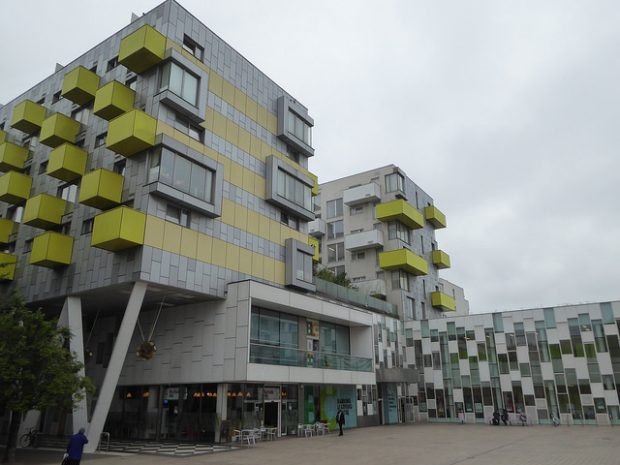
This post serves a double purpose: a report of the meeting, and another in the series to introduce the new NPOs.
Community Solutions
The London Borough of Barking and Dagenham (LBBD) is one of the most deprived areas of London. We had a presentation on the council’s new structure and approach: Community Solutions, which brings together many different council-led services into a single service, with the aim of identifying and resolving the root cause of an individual’s or family’s problems by helping people to help themselves.
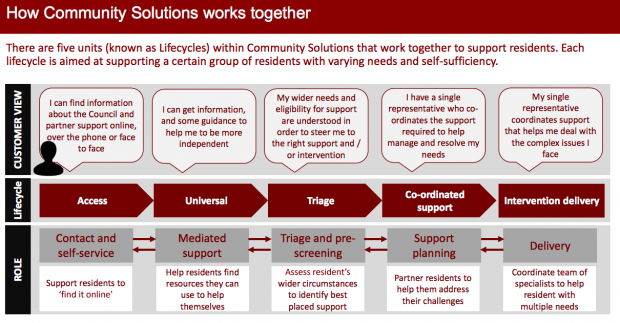
Libraries are viewed as a vital part of the solution, and have developed their links with schools and colleges to cement their position as a much needed part of the overall infrastructure. They are proud of their libraries, and the investment shows: Dagenham library was awarded Library of the Year at the British Book Industry awards in 2016, and Barking learning centre was shortlisted in 2017. LBBD were also awarded LGC council of the year this year.
How libraries fit in
Zoinul Abidin (Head of Universal Services) and Ann Laskey (Commissioning Manager – Libraries) gave us an overview of how their service has evolved over the last 5 years.
Their estate currently includes 6 libraries: 2 main (in Barking, and Dagenham), 2 smaller (Thames View and Valence), and 2 run with the support of volunteers (Marks Gate, at the Marks Gate Community Centre, and Robert Jeyes Community Library, at the Chadwell Heath Community Centre). Their main period of change and restructure was between 2012-14, when 4 libraries were closed. There has however been a re-investment in staff. In 2011-12 the service employed 71.2 FTE staff. This reduced to around 50, then 37.1 in 2016-17. In 2017-18 the total had risen to 72.6.
The vision for libraries was: libraries “at the heart of the community – where exciting and surprising things happen”. The team worked with the University of East London (who share the building), to design a leadership course for staff. As part of that, each participant had to carry out a library project, and was funded to do this.
Zoinul works hard to keep the strategic profile of libraries high. He talks to people around the council, gathering views which inform any new strategy. They are mindful of the impact of branding and the overall look and feel – and we certainly saw a consistent look throughout the space in Barking, with bold colours and clear signposting.
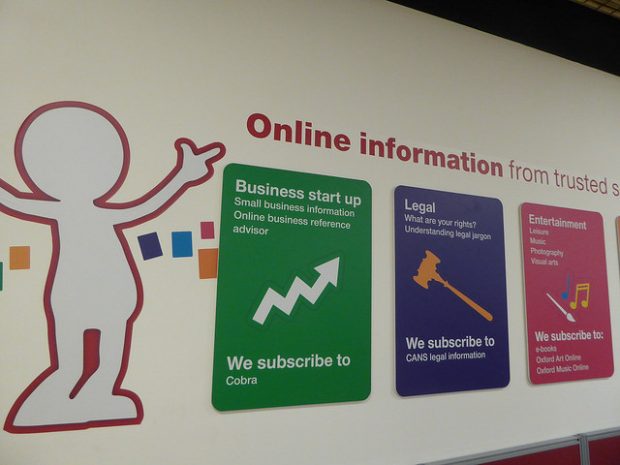
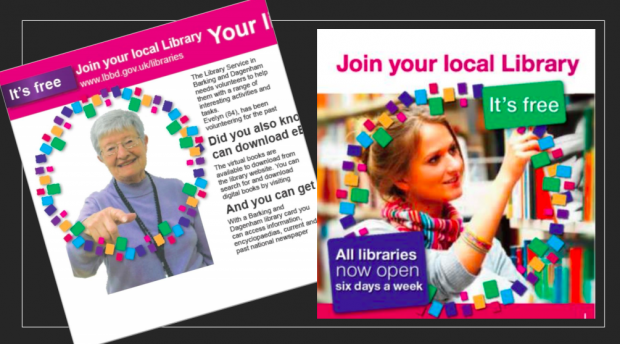
All of their buildings have been refurbished, and they keep a constant eye on how the spaces are being used. They also maximise use of space to help generate income – for example the Barking Learning Centre was used as the election count centre.
Besides the awards mentioned above, they received a £1m grant to refurbish Valence and Chadwell Heath libraries. The Queen performed the official opening of Chadwell Heath community centre. A registered charity operates the centre, that also contains the library. Another tenant is a local arts organisation. The library service has a service level agreement with the centre. The library service they provide stock and the library management system, but the centre is mainly staffed by volunteers (along with some staff supported hours). A person from the library service manages the volunteers rota, and volunteers also have access to corporate training.
Of their smaller libraries, the focus is on the needs of their immediate community. In Thames View, there is a dedicated space for children, which includes an IT space designed specifically for them. In Valence, the focus is on older people, and they offer lots of ‘aging well’ activities, plus an area in the library has a sprung floor to enable exercise activities to take place.
Library programmes include the Reading Zone World of Adventure – a world themed reading challenge all year round, which encourages children to progress with their reading as they make their way through the 10 levels of the scheme, collecting certificates and prizes along the way. There is an event at the end, at which the mayor presents certificates. The events programme also includes open mike nights, themed fun days, Barking and Dagenham’s got talent, a comic con, a handmade in Dagenham craft event and lots more.
Library tour
Our visit as always included a tour. You can get a flavour of this from watching the video embedded on the library’s web page. We started on the first floor, which includes the sizeable conference room with its adjacent kitchen, and saw the bulk of the main lending collection. There were also a good number of computer stations and study spaces, packed mainly with students revising. There are a number of teaching rooms, used by Barking and Dagenham College, and the University of East London.
We then visited what the sign described as the library’s ‘secret oasis’: the Bath Haus spa. Yes, Barking library contains a spa, complete with 2 treatment rooms and a sauna – an innovative use for a low ceilinged, windowless, former classroom. It started as one of the Mayor’s Outer London Fund projects and “Gift of the Games” during the London 2012 Olympics, and proved so popular they are still running. It builds on the tradition of a bath house as a community gathering place, and besides treatments, they also offer yoga and healthy eating classes.
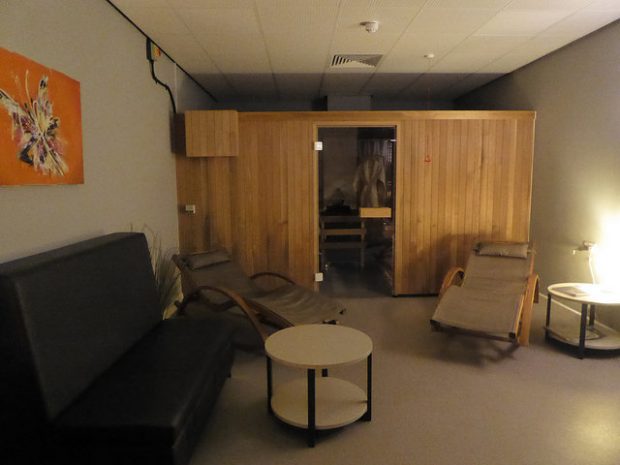
We moved downstairs, passing the café which is situated at the entrance, and visited some of the many partner managed spaces on the ground floor. Digilab is a creative space, where people can experience the latest technology. There is a gallery space, and more teaching rooms used by the college and university. Barking Job shop has a space, as does the Citizens Advice Bureau. We also noticed the room used by Margaret Hodge MP for her constituency office.
The children’s library is on the ground floor, next door to the Playaway day nursery (for children aged 2 to 5), and as with other libraries I’ve visited recently, it includes a sizeable buggy park. The whole section is being reconfigured at the moment, but it is a large space, and there is also a dedicated children’s IT section.
Pen to Print – The National Portfolio Organisation supported programme
Pen to Print grew out of their reading festival: ReadFest, and the programme manager wrote a post in 2017 about the project origins and successes. Their YouTube channel includes films about the project, and one moving piece where an author whose life was genuinely changed through the programme talks about what it means to her. Their lead patron is Martina Cole, and other leading authors take part, including helping by running workshops.

The library service received their first Grants for the Arts award from Arts Council England in 2014, and have had 2 since. They then decided to apply for NPO funding, and were awarded £180k each year for 4 years. This has opened up many new possibilities for the programme, and they now have a 4 year plan of activity, with a theme for each year.
This year’s theme is women and activism – related to the suffrage anniversary and the more local story of the 50th anniversary of the women strikers at Ford, Dagenham over equal pay. Year 2 will centre around digital storytelling, Year 3 on international stories. And Year 4 is entitled “Curated by us”, as that year’s programme will be developed and led by an advisory panel including local people.
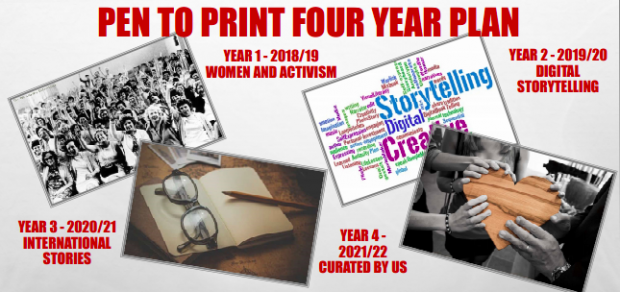
The programme has 3 elements:
- High profile events – which include the awards, ReadFest (this year featuring 100% female authors), and – in pilot this year – a Take Out event – which will take libraries to venues not usually associated with them, for example football clubs and pubs.
- Writer engagement – which takes the form of classes on creative writing, poetry and more. There is a programme of regular sessions, plus one-off workshops – some on specific topics such as synopsis writing, or comic books
- Intensive skills – supporting writers to enter the competition, which might ultimately see their writing become published. The Michael Feld Creative Writing Competition (which existed before Pen to Print) has now been brought into the programme, which has resulted in lots of additional publicity, and lots of new entrants.
New partnerships as a result of the programme
The team have been working with London’s writer development agency Spread the Word, and they will now lead development of the Take Out programme mentioned above. Barking and Dagenham has also been working in neighbouring local authorities, including Newham and Redbridge, and further afield, with the Forum in Southend. These partnerships bring new people to the programme, but also offer opportunities for Pen to Print authors to share their skills.
Benefits of the programme so far
The personal experiences of several participants have been particularly transformative. Pen to Print have successfully published seven books to date and have more in production with partner and self-publisher New Generation. On first consideration some may think that the impact of a creative writing project is limited but Pen to Print has found over the years that there is a huge qualitative benefit to the project. Through people’s shared appreciation of writing we have established a network of people who have already taken part in the project and continue to benefit from peer support. Long-standing relationships have developed between people from diverse backgrounds who would otherwise never have come in to contact with each other.
Participants have developed self-confidence – becoming prolific bloggers, confident public speakers. They’ve discovered family members they didn’t know existed and found long term friendship. Pen to Print alumni have gone on to enroll in University Courses on Creative writing, they have written for magazines and also published further books. They have set up their own peer-led writing groups and have become further involved by becoming judges of competitions. All of these experiences are not quantifiable but have a profound impact on the lives of the people who have participated.
The Project Manager Lena Smith described the professional development benefits for herself and her growing staff, “If it wasn’t for Pen to Print I would still be in a branch library working as a Library Assistant. Being involved in the project has allowed me to expand my horizons, discover new opportunities that I never expected to be available to me and has enabled me to progress to a more senior position than I would ever have expected to achieve. I am now looking at developing my career further. Since Pen to Print secured funding from The Art Council as an National Portfolio Organisation (NPO) we have been able to create new job opportunities which has allowed me to support more people to develop their career in the arts within the project and create a sustainable future for Pen to Print.”
Tags: #ACE-NPO



